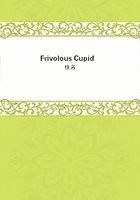
第17章
I must confess at once that at first, at least, I very much admired the curate. I am not referring to my admiration of his fine figure--six feet high and straight as an arrow--nor of his handsome, open, ingenuous countenance, or his candid blue eye, or his thick curly hair. No; what won my heart from an early period of my visit to my cousins, the Poltons, of Poltons Park, was the fervent, undisguised, unashamed, confident, and altogether matter-of-course manner in which he made love to Miss Beatrice Queenborough, only daughter and heiress of the wealthy shipowner, Sir Wagstaff Queenborough, Bart., and Eleanor, his wife. It was purely the manner of the curate's advances that took my fancy; in the mere fact of them there was nothing remarkable. For all the men in the house (and a good many outside) made covert, stealthy, and indirect steps in the same direction; for Trix (as her friends called her) was, if not wise, at least pretty and witty, displaying to the material eye a charming figure, and to the mental a delicate heartlessness--both attributes which challenge a self-respecting man's best efforts.
But then came the fatal obstacle. From heiresses in reason a gentleman need neither shrink nor let himself be driven; but when it comes to something like twenty thousand a year--the reported amount of Trix's dot--he distrusts his own motives almost as much as the lady's relatives distrust them for him. We all felt this--Stanton, Rippleby, and I; and, although I will not swear that we spoke no tender words and gave no meaning glances, yet we reduced such concessions to natural weakness to a minimum, not only when Lady Queenborough was by, but at all times. To say truth, we had no desire to see our scalps affixed to Miss Trix's pretty belt, nor to have our hearts broken (like that of the young man in the poem) before she went to Homburg in the autumn.
With the curate it was otherwise. He--Jack Ives, by the way, was his name--appeared to rush, not only upon his fate, but in the face of all possibility and of Lady Queenborough. My cousin and hostess, Dora Polton, was very much distressed about him. She said that he was such a nice young fellow, and that it was a great pity to see him preparing such unhappiness for himself.
Nay, I happen to know that she spoke very seriously to Trix, pointing out the wickedness of trifling with him; whereupon Trix, who maintained a bowing acquaintance with her conscience, avoided him for a whole afternoon and endangered all Algy Stanton's prudent resolutions by taking him out in the Canadian canoe.
This demonstration in no way perturbed the curate. He observed that, as there was nothing better to do, we might as well play billiards, and proceeded to defeat me in three games of a hundred up (no, it is quite immaterial whether we played for anything or not), after which he told Dora that the vicar was taking the evening service--it happened to be the day when there was one at the parish church--a piece of information only relevant in so far as it suggested that Mr. Ives could accept an invitation to dinner if one were proffered him. Dora, very weakly, rose to the bait. Jack Ives, airily remarking that there was no use in ceremony among friends, seized the place next to Trix at dinner (her mother was just opposite) and walked on the terrace after dinner with her in the moonlight. When the ladies retired he came into the smoking room, drank a whisky and soda, said that Miss Queenborough was really a very charming companion, and apologized for leaving us early, on the ground that his sermon was still unwritten. My good cousin, the squire, suggested rather grimly that a discourse on the vanity of human wishes might be appropriate.
"I shall preach," said Mr. Ives thoughtfully, "on the opportunities of wealth."This resolution he carried out on the next day but one, that being a Sunday. I had the pleasure of sitting next to Miss Trix, and I watched her with some interest as Mr. Ives developed his theme. I will not try to reproduce the sermon, which would have seemed by no means a bad one had any of our party been able to ignore the personal application which we read into it; for its main burden was no other than this--that wealth should be used by those who were fortunate enough to possess it (here Trix looked down and fidgeted with her Prayer-book) as a means of promoting greater union between themselves and the less richly endowed, and not--as, alas! had too often been the case--as though it were a new barrier set up between them and their fellow-creatures (here Miss Trix blushed slightly, and had recourse to her smelling-bottle). "You," said the curate, waxing rhetorical as he addressed an imaginary, but bloated, capitalist, "have no more right to your money than I have. It is intrusted to you to be shared with me." At this point I heard Lady Queenborough sniff and Algy Stanton snigger. I stole a glance at Trix and detected a slight waver in the admirable lines of her mouth.
"A very good sermon, didn't you think?" I said to her, as we walked home.
"Oh, very!" she replied demurely.
"Ah, if we followed all we heard in church!" I sighed.
Miss Trix walked in silence for a few yards. By dint of never becoming anything else, we had become very good friends; and presently she remarked, quite confidentially:
"He's very silly, isn't he?"
"Then you ought to snub him," I said severely.
"So I do--sometimes. He's rather amusing, though.""Of course, if you're prepared to make the sacrifice involved----""Oh, what nonsense!"
"Then you've no business to amuse yourself with him.""Dear, dear! how moral you are!" said Trix.